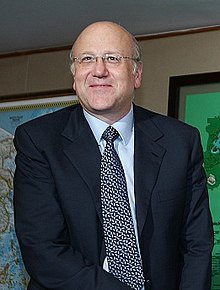Najib Mikati
| Najib Mikati نجيب ميقاتي |
|
|---|---|
 |
|
| 31st Prime Minister of Lebanon | |
|
In office 13 June 2011 – 15 February 2014 |
|
| President | Michel Suleiman |
| Deputy | Samir Mouqbel |
| Preceded by | Saad Hariri |
| Succeeded by | Tammam Salam |
|
In office 19 April 2005 – 19 July 2005 |
|
| President | Émile Lahoud |
| Deputy | Elias Murr |
| Preceded by | Omar Karami |
| Succeeded by | Fouad Siniora |
|
Member of Parliament for Tripoli |
|
|
Assumed office 20 April 2000 |
|
| Preceded by | Omar Karami |
| Personal details | |
| Born |
24 November 1955 Tripoli, Lebanon |
| Political party | Majd Movement |
| Other political affiliations |
March 8 Alliance |
| Alma mater | American University of Beirut |
| Religion | Sunni Islam |
| Website | Official website |
Najib Azmi Mikati (Arabic: نجيب ميقاتي; born 24 November 1955) is a Lebanese politician who served twice as the Prime Minister of Lebanon. From April 2005 to July 2005 he was Prime Minister of Lebanon in a caretaker government. On 25 January 2011, he was nominated to serve as Prime Minister by a majority of the votes in the parliamentary consultations following the 12 January fall of the Lebanese government of November 2009. The government was formed on 13 June 2011, after many delays. On 22 March 2013, Mikati submitted his resignation from office, which Lebanese president Michel Suleiman accepted on 23 March 2013.
Mikati was born on 24 November 1955 and hails from a prominent Sunni Muslim family based in Tripoli. He graduated from the American University of Beirut in 1980 with a Master of Business Administration (MBA) degree. He also attended a summer school program held at Harvard and the French business school INSEAD.
Mikati co-founded the telecommunications company Investcom with his brother Taha in 1982. He sold the company in June 2006 to South Africa's MTN Group for $5.5 billion. In April 2015, Forbes estimated his net worth at $3.3 billion, making him the richest man in Lebanon.
After being appointed Minister of Public Works and Transport on 4 December 1998, Mikati was elected to the Lebanese parliament from his hometown of Tripoli in 2000, outpolling Omar Karami, who was elected from the same multimember constituency. As a parliamentarian, Mikati retained his cabinet position and developed a reputation as a moderately pro-Syrian politician with a normal relationship with Syrian president Bashar Assad. Later Mikati was made transportation minister and became an ally of then Lebanese president Emile Lahoud, supporting the extension of his term in 2004.
...
Wikipedia
